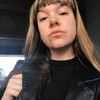This is a column called Pity Party and it is brought to you by Lauren O'Neill from Noisey UK. It's about music (obviously) and feelings and #feelings. Please cry along, thanks.Despite an overwhelming lack of public demand, January happened. As a month it outstays its welcome – it is the last person at your house party when all you want to do is go to fucking sleep. December spoils us with festivity and decadent crisps, and the first month of the year throws us back into monotony, and penny-pinching, and the freezing, unforgiving cold. More than anything, it can be so solitary; an endless-seeming cycle of too much Netflix and welling up in Marks and Spencer’s, resigning yourself to the fact that yes, you will be eating the 'Two Dine for £10' meal deal to yourself, in bed, again.
Advertisement
If you too find yourself existing within an eventuality of that sort, you could do worse than putting on American Weekend, the 2012 debut album from Katie Crutchfield's solo Waxahatchee project. Despite being the most rudimentary of her four LP-strong discography, American Weekend is the one I find myself returning to, especially when I feel lonely – not because it offers comfort, but because it offers solidarity, which I suppose is comfort of a different sort. It’s a particularly helpful album to listen to in January, because while it’s an appropriate conduit for the sentiments commonly felt throughout the month (hopelessness, loneliness, over-reliance on frozen potato foods bunged in a roaring oven), its summery feel is also a distraction from the physical realities of shit weather and central heating. Despite its outdoorsy warmth, however, American Weekend is intimate too.Take the record’s opener “Catfish”: the recording is fuzzy, the guitar-playing is delicate, the vocal almost a whisper, the poetry of the lyrics recited as if it were the only time they’d ever been said aloud. The song functions as a series of snapshots, of moments captured, brought together abstractly. It remembers better times – closeness, conversation, “Getting high in Portland, Oregon” – and it sets the tone for the entire album. The final two lines on "Catfish" are thus: “It'll look just like heaven when I get up and leave / You're a ghost and I can't breathe.” American Weekend is a set of songs about transience, other people, and the way we process both. To use Crutchfield’s own phrasing: the past, and the figures in it, often resemble a type of heaven once we’ve left them behind.
The tracks on American Weekend often feel like they’re located in the time you spend reflecting on something once it’s happened, when it exists only in your memory. The record’s final track “Noccalula” forms a companion piece to “Catfish”, capturing the simple, painful truth of the passage of time in a rare, plain way: “You’ve got a husband now / I have Waxahatchee Creek / And you used to come here with me,” Crutchfield sings, an entire past contained in the longer breath she takes before the third line.
Advertisement
Crutchfield’s lyrics on American Weekend are as emotionally dense as they had been for P.S. Eliot, one of the bands she played in with her sister Allison (of the much-loved Swearin’) before starting Waxahatchee. The dramatic scene Crutchfield paints on “Noccalula” – of a sole woman standing against the vastness of nature, left to herself by the players of her past – is one instance of her ability to cram so much impact into only a few words. Later on the song, she notes more abandonment (“Allison’s only calling me when her life’s falling apart,” she sings of her sister). Indeed, loneliness (and aloneness, because they’re not the same thing) feel like the default setting for American Weekend, making for an absorbing sonic environment. There is no way to listen to "Bathtub," for example, without feeling like you too are naked and alone, exposed to sun streaming onto your body through a window cracked open 45 degrees, your skin slick with water and your own dirt.And even the one track that reads as a sweet, present ode to companionship, “Be Good,” is crisp at its edges with sadness. On the surface, it’s a breezy disavowal of Anything Too Serious, all sunny chords, smitten late night phone calls: “You don’t wanna be my boyfriend / And I don’t wanna be your girl,” the lyrics attest. Maybe it’s just me and my own projections, but Crutchfield’s refusal of a real relationship, one outside of the non-committal “world” she and her subject have built for themselves, isn’t that persuasive, but it is one I know by heart. One section reveals her reservations:
Sometimes it’s simpler to allow a good thing to remain a good thing, crystallised in time, a perfect season to look back at – that’s what Crutchfield decides for the romance on “Be Good.” One phrase quoted above, however, stands out. “I’ll disappear.” For me it brings to mind the ways in which some relationships drain you, wringing out your essential self until you have managed to squeeze into a mould of what someone else wants. Katie Crutchfield can see it coming on “Be Good,” so she avoids it, choosing instead to retain herself, even if it means inhabiting loneliness from time to time.I began January uncomfortable in my own solitude, but American Weekend helped. It’s a record that urges me to know myself better, and make myself better; to exist within loneliness, to explore it, and eventually to possess it, until it simply becomes aloneness, which is better. I spent a while last month mourning the un-slept-in-ness of one side of my bed, but Waxahatchee and American Weekend, with their candour, reflection, and dedication to flawed selfhood, reminded me that just meant more space to stretch out my own weary limbs.You can find Lauren on Twitter.You don't wanna be my boyfriend
And that's probably for the best
Because that, that gets messy
And you will hurt me
Or I'll disappear
